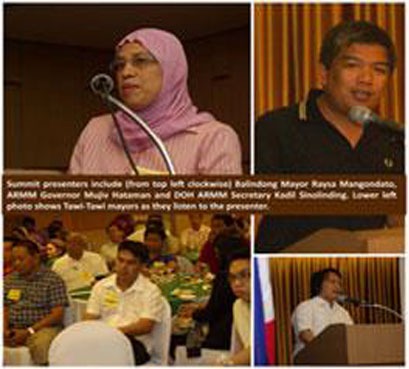Summit held for health and education improvements in ARMM
News | by Almi Atienza

It is a region mired in poverty, where quality health services for the poor remain elusive while “ghost teachers” abound though there are still over 2,000 teaching positions waiting to be filled-up. The dire health and education situation in the Autonomous Region in Muslim Mindanao led the Zuellig Family Foundation (ZFF) and Synergeia Foundation to work together, starting with a summit to discuss opportunities for improvements in the region.
According to guest presenter, ARMM Health Secretary Kadil Sinolinding, poverty incidence in the region is 54-percent. He said that, “When people are poor, they would have less access to quality health services.” The region’s maternal mortality ratio (MMR) as of 2008 is 245 while national average for the same year is 162. In the same year, infant mortality rate (IMR) in the ARMM is 56 while country average is 24.9.
The ZFF has been partnering with ARMM municipalities since late 2008. For its third set of partner-municipalities, the Foundation chose in 2011 eight towns all from the ARMM. That partnership, which started last year, has helped drastically reduce their collective MMR from 180 in 2010 to 64 in 2011.
Among ZFF’s partner-municipality is Balindong, Lanao del Sur. The town’s mayor, Raysalam Mangondato, was present during the summit and talked about how one year’s worth of actively engaging local health stakeholders like the municipal health officer, village and religious leaders, rural health workers and local health board helped improve her municipality’s maternal and infant health situation. Balindong’s MMR last year dropped to zero from 648 in 2010 while its IMR fell to 2.16 in 2011 from 8.64 in 2010.
Currently, Mangondato is working to make formal arrangements with village leaders to establish a community-based health campaign in her locality.
On the problems in education, ARMM Education Secretary Jamar Kulayan called for reforms to address the issues of “ghost schools, ghost pupils, and ghost teachers.” According to Kulayan, the problem deprives the region, where 2,000 plantilla positions remain vacant, of much needed resources to improve educational outcomes.
For Mayor Hussin Amin of Jolo (Sulu), investing time and the local government’s financial resources to address school system issues can urge locals to respond better to reform efforts. He also mentioned about how training programs for teachers and an active local school board can improve the educational system.
The ARMM Education and Health Summit, held last March 21 in Zamboanga City, was attended by 27 mayors from the provinces of Basilan, Sulu and Tawi-Tawi. It was a venue to assist the regional government in improving health and educational systems in the local government units (LGUs).
During the summit, ARMM Governor Mujiv Hataman discussed how mayors can gain access to funding by practicing transparency. According to Hataman, his administration will be making information about government spending available to the public. LGUs that follow this example will then be able to obtain financial resources from the regional government’s stimulus fund for health and savings from operations in education for the past months.
Mayors in attendance then had the opportunity to discuss their priority health and education programs for the next 14 months during a workshop in the summit. Outputs of the workshop will be consolidated with those of another summit to be held for mayors of Maguindanao and Lanao del Sur. The combined outputs will then be presented to the regional governor for his action.